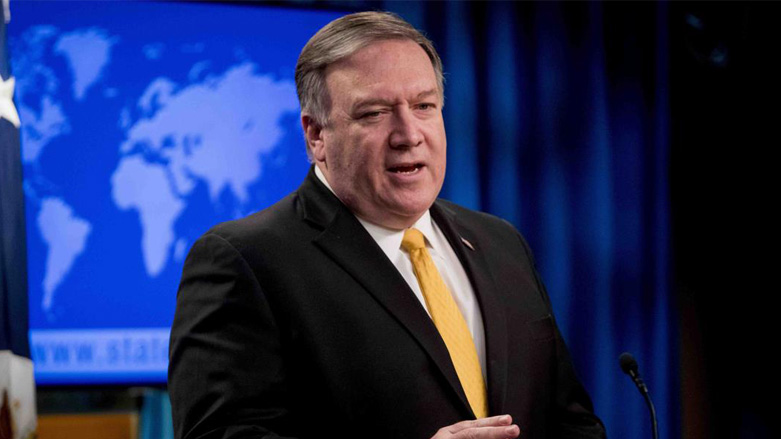Pompeo reaffirms US commitment to Syrian Kurdish-led SDF

WASHINGTON DC (Kurdistan 24) - On Saturday, in a phone conversation with Turkish Foreign Minister Mevlut Cavusoglu, Secretary of State Mike Pompeo reiterated US support for the Kurdish-led Syrian Democratic Forces (SDF.)
Saturday’s discussion was the first exchange between the two officials since Wednesday when Washington announced that Turkey would be excluded from the F-35 program, because it has begun to take delivery of Russia’s advanced air defense system, the S-400.
READ MORE: White House affirms Turkish exit from F-35, as Pentagon provides details
According to a summary of their conversation released by State Department Spokesperson Morgan Ortagus, Pompeo, speaking of Syria, reiterated the “US Government’s obligation to ensure the protection of local partners working with the United States and the Global Coalition to Defeat ISIS.”
Pompeo also reaffirmed the US “commitment to addressing Turkish security concerns along the Turkish-Syria border,” underscoring the delicate balancing act the US has long pursued in northeast Syria.
Since last week, when the S-400s began to arrive, Turkey has concentrated troops on the Syrian border, as if threatening an attack on the SDF, whose Kurdish leadership—the People’s Protection Units (YPG)—it regards as terrorists, because of their ties to the Kurdistan Workers’ Party (PKK.)
At that time, the US warned Turkey against any cross-border attack into Syria, and Pompeo may have repeated that warning on Saturday.
READ MORE: US warns Ankara, amid Turkish force build-up and talks on Syria
Pompeo also informed Cavusoglu of Washington’s “disappointment over Turkey’s acquisition of the Russian S-400,” Ortagus said.
With Ankara’s receipt of the Russian weapons system, the administration is required by US law, known as CAATSA (Countering America’s Adversaries Through Sanctions Act), to impose economic sanctions on Turkey.
Trump has cultivated a personal relationship with Turkish President Recep Tayyip Erdogan and has appeared reluctant to impose such penalties.
Indeed, on Thursday, when a reporter asked about possible sanctions on Turkey, Trump responded, “No, we’re not looking at that right now.” An hour later, however, when asked the same question, he responded, “We’re looking at it.”
Subsequently, it became clear that the decision will be taken in consultation with Congress. On Friday, the White House issued invitations to all Republican senators to a meeting on Tuesday to discuss the issue of sanctions for Turkey.
There is little sympathy in Congress for the Turkish government, as Eric Edelman, who served as US ambassador to Ankara in the George W. Bush administration, recently told the Foundation for Defense of Democracies.
A week ago, the Republican chairmen of the Senate Armed Services and Foreign Relations Committees, Sen. Jim Inhofe (Oklahoma) and Sen. Jim Risch (Idaho), called for a tough response to Turkey’s acquisition of the S-400.
READ MORE: Russian missiles start arriving in Turkey, amid disjointed US response
On Thursday, others weighed in, even more strongly. Sen. Rick Scott (R, Florida), a Navy veteran and a member of the Armed Services Committee, and Todd Young (R, Indiana), also a Navy veteran, serving on the Foreign Relations Committee, introduced a “sense of the Senate” resolution. Such a resolution is not binding, but reflects the opinion of the legislative chamber.
Their resolution not only calls for imposing CAATSA sanctions, but presents a list of complaints against Erdogan’s government, including that it has taken Turkey “down a path of authoritarianism and human rights abuses, aligns itself with radical Islamic terror groups, and agitates against regional allies of the United States, including Israel.”
The resolution also calls upon Trump to consult with other NATO members and “consider the continued inclusion of the Republic of Turkey in NATO.”
Turkish officials have protested that the one step taken so far against their country—exclusion from the F-35 program—was “unfair” and “against the spirit of alliance.” However, Dr. Aykan Erdemir, a former Turkish parliamentarian and now a Senior Fellow at the Foundation for Defense of Democracies, told Kurdistan 24 that the US decision appeared to be “no surprise to Ankara.”
Its “reaction is a form of posturing,” aimed at “preventing or softening the CAATSA sanctions,” Erdemir suggested. “Erdogan is still under the impression that this personal rapport with Trump” will “shield him from the CAATSA sanctions, or at least the harder ones.”
But given Congress’ reaction so far, Erdemir concluded, “Erdogan might soon learn a lesson in [Washington’s] separation of powers”—as enshrined in the US constitution.
The phone conversation between Pompeo and Cavusoglu occurred on the eve of a visit that Amb. James Jeffrey, Special Representative for Syria Engagement and Special Envoy for the Global Coalition to Defeat ISIS, will make on Monday to Ankara. Jeffrey will lead a US delegation for a working group meeting on Syria, the Turkish media has reported.
